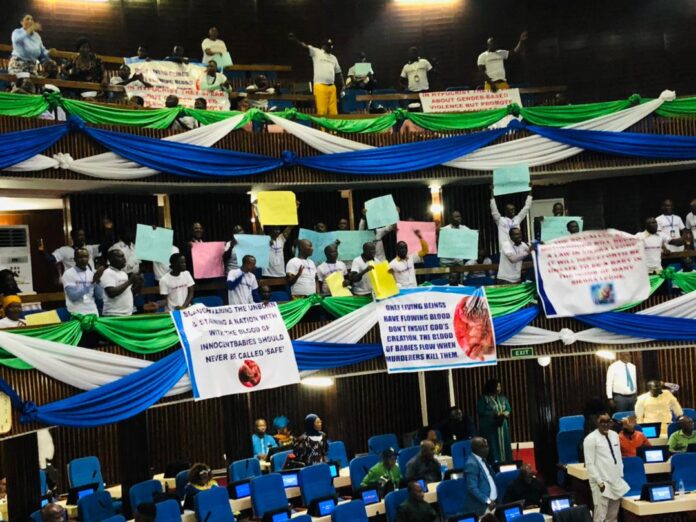
By Lawrence Williams
Parliamentary proceedings to decriminalise abortion in Sierra Leone began today in a heated and emotionally charged environment, with lawmakers expressing contrasting viewpoints on a subject that many perceive as alien to the African culture.
Some civil society groups have signaled their approval for the government to move forward with enacting the Safe Motherhood and Reproductive Health Care Bill, while others have formed a protest movement to thwart its passage into law.
Sources suggest that this division among civil society stems from incentives provided to certain groups in exchange for their support of the legislation to the exclusion of others.
Pro-life campaigners, mostly from religious groupings, occupied the lower and upper galleries, protesting with placards and chanting “no way” to the proposed law.
Lawmakers failed to reach a consensus on procedural matters, causing the session to end abruptly, with the speaker allegedly receiving a summons at State House.
The proposed law seeks to grant legal recognition for terminating pregnancies up to 14 weeks of gestation in cases where there are complications that threaten or endanger the life of a pregnant woman or the unborn child. Furthermore, it seeks to accord women the right to keep or terminate a pregnancy and to determine the number and spacing of their children.
Pro-choice campaigners argue that women should exercise absolute control over their bodies, including the prerogative to decide what happens to the foetus in the womb.
However, pro-life campaigners think otherwise. They argue that abortion is an import of the West. And although it could be allowed for severe complications and life-threatening circumstances such as those mentioned above, the absolute freedom to determine whether a baby lives or dies is an abrogation of the right to life, noting that protection of the right to life begins at the conception stage.
Although the bill seems to have the backing of major civil society groups in the country, it doesn’t sit well with the Pentecostal Fellowship of Sierra Leone, the Inter-Religious Council, and others. These religious groups are protesting against the proposed law, citing moral and biblical standards and principles as reasons for doing so.


